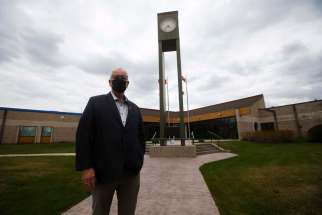Failure to communicate with health staff costly
Read this article for free:
or
Already have an account? Log in here »
To continue reading, please subscribe:
Monthly Digital Subscription
$0 for the first 4 weeks*
- Enjoy unlimited reading on winnipegfreepress.com
- Read the E-Edition, our digital replica newspaper
- Access News Break, our award-winning app
- Play interactive puzzles
*No charge for 4 weeks then price increases to the regular rate of $19.00 plus GST every four weeks. Offer available to new and qualified returning subscribers only. Cancel any time.
Monthly Digital Subscription
$4.75/week*
- Enjoy unlimited reading on winnipegfreepress.com
- Read the E-Edition, our digital replica newspaper
- Access News Break, our award-winning app
- Play interactive puzzles
*Billed as $19 plus GST every four weeks. Cancel any time.
To continue reading, please subscribe:
Add Free Press access to your Brandon Sun subscription for only an additional
$1 for the first 4 weeks*
*Your next subscription payment will increase by $1.00 and you will be charged $16.99 plus GST for four weeks. After four weeks, your payment will increase to $23.99 plus GST every four weeks.
Read unlimited articles for free today:
or
Already have an account? Log in here »
Hey there, time traveller!
This article was published 18/05/2021 (1665 days ago), so information in it may no longer be current.
Knowledge is power.
Anyone who grasps the veracity of this ageless snippet of wisdom also no doubt understands there are at least a couple of ways in which information can empower.
The first, more direct method is simply by acquiring knowledge by learning, thereby gaining a greater understanding and an enhanced ability to turn knowledge into action that produces positive results.

The second and decidedly more backhanded strategy relies less on gaining knowledge oneself and more on denying information to others — the obvious conclusion being that if one’s perceived opponents are kept figuratively in the dark, that information deficit will create advantages and opportunities for the more informed adversary to hold sway in a given situation.
When it comes to the government of Premier Brian Pallister and its ongoing response to the COVID-19 pandemic, it has become clear during the past 15 months that both approaches are equally in play.
Without question, the province’s pandemic response has involved accessing expertise and gaining knowledge as the global coronavirus struggle has progressed. The continuing front-and-centre presence of chief provincial public health officer Dr. Brent Roussin and various other senior health officials has provided guidance and reassurance that have been invaluable to Manitoba’s pandemic effort.
But the government’s crisis-management team — including the aforementioned health experts — has been inexplicably reluctant, at times even obstinate, when it comes to publicly sharing the information that has informed the province’s pandemic-response decisions.
Consider, for instance, the reaction of front-line hospital staff this week to provincial plans for dealing with the current surge of COVID-19 cases that has made Manitoba the nation’s pandemic hot spot and pushed hospital admissions and intensive-care placements beyond the prescribed limits for safe and reasonable care.
“Most of us feel that it’s been almost day-to-day planning,” said intensive-care physician Dr. Eric Jacobsohn. “And if there is better planning — (as) you would hope — then it has not been clearly communicated.”
Calling the province’s failure to keep front-line medical staff informed “unneeded trouble,” Dr. Jacobsohn said doctors and nurses had not been provided with the province’s pandemic modelling information until it was publicly released — after weeks of promises and delays — during a media briefing last Friday.
“The least we can ask of our leaders is (to) be clear, be transparent and, in fact, involve your front-line staff in helping you make decisions,” he said.
Sadly, this failure to communicate is anything but an isolated incident. Throughout the pandemic, the province has neglected to keep health-care staff at the heart of the COVID-19 fight — doctors, nurses, support staff — apprised of its necessarily evolving plan, while at the same time regularly ignoring or downplaying warnings from health staff about working conditions, staffing issues and burnout, as well as observed COVID-19 trends that medical personnel have said required immediate tightening of restrictions on public behaviour.
All of which suggests a chronic failure or deliberate disinclination on the province’s part to communicate — a process that involves both speaking and listening — and renders Monday’s statement by Shared Health chief nursing officer Lanette Siragusa that “we want to hear from them … so please speak up” all but meaningless.
The province’s decision to keep the general public in the dark about its pandemic strategy is one thing, of a consistently annoying sort. Quite another, of a decidedly counterproductive and potentially dangerous nature, is its continued refusal to involve health-care professionals, who toil daily on the front lines of the COVID-19 fight, in the communication loop.





